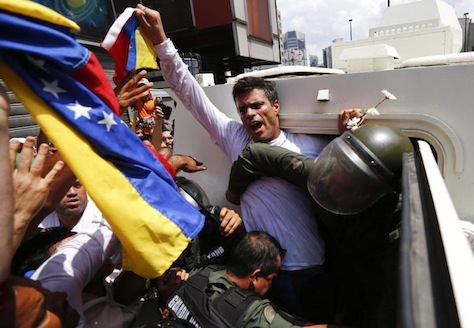Before Thursday’s jaw-dropping 77-minute free-form press conference, US president Donald Trump made a rare foray into Latin American politics on Wednesday night, publicly calling for the release of Leopoldo López, a Venezuelan opposition leader imprisoned by the chavista government since 2014. ![]()
It was a surprising move by Trump, who was having dinner Wednesday night with López’s wife, Lilian Tintori, and Florida senator Marco Rubio. Trump joins many figures from across the political spectrum over the last three years, including former US president Barack Obama and Spanish prime minister Mariano Rajoy, who renewed calls to release López on Thursday.
López, on the third anniversary of his arrest, is now at the heart of the Venezuelan opposition struggle in its daunting task of removing an increasingly undemocratic chavista regime through democratic means. Despite Trump’s call on Twitter to free López, a Venezuelan appeals court upheld the opposition leader’s sentence Thursday morning, and foreign minister Delcy Rodríguez chided Trump in response.
In February 2014, when protestors were already taking to the streets against Maduro’s government (and when the economic situation, though dire, was far better than today), López was leading the way calling for peaceful protests in hopes of toppling the government through show of popular disapproval. Those protests, however, turned deadly when police deployed lethal force against the protesters and 43 people died. López was promptly arrested and, months later in September 2015, found guilty of public incitement of violence. His imprisonment is widely considered to be politically motivated by international groups and figures ranging from the United Nations to the Dalai Lama, and his arrest was one of the reasons why the South American trading bloc, MERCOSUR, suspended Venezuela’s membership in December 2016, citing problems with human rights and the rule of law. Even before the rise of Miranda governor Henrique Capriles in 2012 and 2013 as the consensus opposition leader in challenging Hugo Chávez in the October 2012 presidential election and, later, Nicolás Maduro in the April 2013 vote after Chávez’s death, López was pegged as a man who might lead Venezuela into a post-chavismo era. Back in 2008, the chavista regime found López such a potential threat that they banned him, purportedly on the basis of corruption charges, from running for national office.
The similarities between Capriles and López are striking. They have both held office in the same geographic location: López served as the mayor of Chacao, one of the five municipalities of Caracas, between 2000 and 2008; Capriles is the current governor of Miranda state, which includes parts of Caracas (including Chacao). Both come from established, relatively wealthy families in Venezuela. Both are young (López, age 45, is actually one year older than Capriles), fit and attractive.
There are, however, important differences. López has always been the more aggressive, Capriles the more cautious, and that’s why the former has been in prison for nearly three years. Capriles’s caution may have made him the more appealing candidate in 2012 and 2013. But today, even though the Capriles-led opposition Mesa de la Unidad Democrática (MUD, Democratic Unity Roundtable) won the December 2015 parliamentary elections, Maduro’s government continues to govern Venezuela with almost unchecked authority, as chavistas have ably infiltrated the military, the judiciary, the executive branch and even key sectors of industry, notably the nationalized oil sector. The country’s economy is still in freefall, with chronic shortages due to depressed global oil prices and with the resulting hyperinflation of the value of the bolívar. Most Venezuelans are fed up with Maduro (never as personally popular as Chávez), who will likely not face voters again until 2018 at the earliest, despite ongoing opposition attempts last year to force a recall referendum. In 2016 alone, the Venezuelan economy contracted by a staggering 18.6%, while inflation leaped by 800% as hardship and even malnutrition began to affect some of the most vulnerable. That follows a 3% drop in 2014 and a deeper 7% contraction in 2015, making Venezuela the world’s worst-performing economy for nearly two years running.
With the chavistas all but governing around the opposition supermajority in Asamblea Nacional (National Assembly), López may have the better political street fighting skills to rope-a-dope Maduro more effectively by the time the next election arrives.
Throughout his imprisonment, however, López has only grown in stature. Sitting in jail as a political prisoner, he has gained sympathy even from those Venezuelans wary of the opposition as too monied and patrician to understand their needs. When the Maduro administration filed an arrest warrant for López back in 2014, he turned himself into authorities immediately after delivering a rousing speech to protestors, effectively turning his arrest into a spectacle that pitted López as the most vocal challenger to Venezuela’s status quo, which has only spiraled downwards. Later in 2014, he was able to write an op-ed for The New York Times, ably making the case against Maduro.
López, who is the great-great-grandnephew of Simón Bolívar, the 19th century libertador that Venezuela (and much of South America) claims as a founding father, has always posed a direct threat to the underlying legitimacy of the chavistas, who have used Bolívar’s image to cloak their socialist policy program as ‘Bolivarian’ for over 15 years.
When López leaves prison, probably in triumphant style, he will be the undisputed moral leader of the fight against chavismo. That’s even though his party, Voluntad Popular (Popular Will), which López founded in 2009, is a relatively small member of the opposition coalition.
Though López only played a supporting role in the 2012 and 2013 elections, and though imprisoned during the 2015 parliamentary campaign, he will undoubtedly play a key role in bringing down the now-discredited Maduro regime, from inside prison or from outside.
